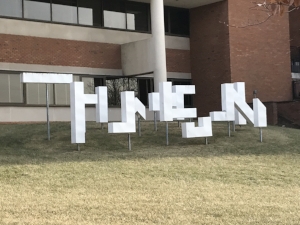Coincidence? I Think Not.
On the news they were talking about the opiate crisis and the call from public health professionals for the government to step in and monitor/regulate the distribution of Naloxone. Naloxone (aka Narcan) is an opiate receptor antagonist- eliminates all signs of opioid intoxication and can reverse an opioid overdose. By making it universally affordable and available, everyone will have (theoretically) access to the anti-opiate drug and we can potentially save those who might otherwise die from overdose.
They told the story of a woman who was driving and passed a group of people standing around a car on the side of the road. She pulled over and asked if they needed any help. A man next to her said that there was nothing she could do- the two people were dead. Overdosed. The woman went to assess the slumped individuals, pulled some Naloxone from her purse, squirted it up their noses and by the time the paramedics had arrived, the two individuals were stirring.
Now the story was placed in the report to emphasis the importance and need of Naloxone to be available to all people. I wonder what those two addicts in the story thought about this woman who just happened to be passing by, just happened to know all about drug overdose, just happened to have Naloxone in her purse and just happened to work for a non-profit devoted to distributing Naloxone to the public. Did they think it was all a coincidence and that there are no connections?
I hear it and think, "Thank God that woman was there at the scene. Don't they know how fortunate they are?. Don't they know that there must be a reason they didn't die? Don't they want to take advantage of having a second chance on life?" All those combinations of facts should register that this was no accident: they have been rescued for a reason.
But, things don't have to be that dramatic to understand that there are no coincidences in life. There are times when things happen and there is no other logical explanation than "it was a God thing." We have been witness to it over the years: a check appears in the mail just when we are low on food funds, a stranger out of nowhere helps push our stalled car out of a busy intersection, that same car doesn't stop in the middle of a barreling traffic turnpike with no pull off (we would have been crushed and killed) but limps along until we can exit, the third class mailing for a summer program which intrigues our son, which has him attend the program, then apply to the school, be accepted into the internship program, make connections, life long friends and a successful business, an out of the blue call to an almost forgotten job application which leads to a promising career at a time when the prior job is drying up.
Whether or not you believe in God or think that there is a cosmic coincidence going on, you must admit that it is important to see things in context. We are quick to say "I am so unlucky" and look at all the ways the universe conspires against us. But if we were to make a tally sheet: universe versus advantages, I think that we would find that there are just as many positives (probably more) than negatives. It is just our human nature to notice the negative, or the lack rather than the positive.
My perspective is that it is God orchestrated. There are events that happen in our lives that cannot be attributed to random happenings: they are too specific and coordinated. I truly believe that God wants the best for each one of us. I also believe that when things work out for our benefit, it is another opportunity for God to show us how much He cares for us and for the things about which we care. It is also an opportunity for us to trust Him with our life details. While we trust God completely with our future, we are not just puppets in a play. We do have some choice in what we do, how we live our lives and how we engage or disengage in life responsibilities. It is just when we start looking for God's hand in our lives, we will see how much He is involved, how much He cares for us, how much He loves us and how things are not just coincidences. And if you think about it- if things are orchestrated and not just random, then what happens in our lives matters and is important. All events have purpose and all people and all relationships have purpose.
If you feel that the world is against you, take this week to notice and write it all down: negative and positive, what went "right" and what went "wrong". What did you discover? Are there connections among the happenings in your life? If so, what are they? If you start to see connection, what does that tell you about your role in it all? How does that make you feel?
In the immortal quotes from one of my favorite films, "The Incredibles":
"Coincidence. I think not."















